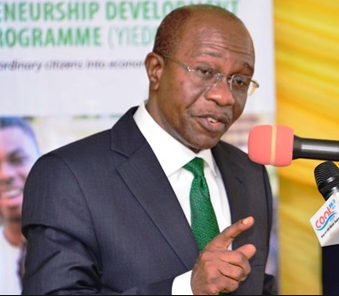
Governor of Central Bank of Nigeria (CBN), Godwin Emefiele, said the bank has identified smuggling and dumping as major challenges sabotaging Nigeria’s economic policies, noting that the bank accounts of some companies found culpable in the illegal importation of textile, rice and palm oil have been blocked.
The apex bank governor said this weekend on the sideline of a consultative roundtable with some economic stakeholders in Lagos titled, “Going for Growth”.
Emefiele said, “We have identified smugglers and people dumping goods as those who sabotage those policies and we decided that we will deal with them. The strategy that we came up with is that we will not bother ourselves with them.
“There is an agency of government that is responsible for border control and if these people pass through the border control we would use the instrumentality of being the regulator of the banking system to make sure that we get the banks to provide all details about them.
“We investigate their accounts and if they are found in economic sabotage, boarding, smuggling and dumping in Nigeria, we would not only block their accounts, we would close their accounts in all the Nigerian banks simultaneously.”
He also said the CBN asked commercial banks to close those companies’ accounts and those of the top members of such entities.
The bank chief said CBN in due course would come up with the names of those that had been identified.
“We want to be sure that we come up with something that is credible and cannot be denied. At this stage we have already blocked the accounts of some in the textile, rice and palm oil companies.
“We are investigating those accounts and as information becomes clearer, we can clearly say that they committed the offence. We would then go to the next level which is to forbid any Nigerian bank from maintaining accounts for these people,” he said.
The roundtable was held to encourage participants to highlight important building blocks that will lead to greater economic growth in the country.
It also involved the CBN governor listening to their ideas and views on how productivity and investments by companies operating in Nigeria can be improved.
Others include how to reduce the nation’s dependence on imported goods and increase exports of non-oil goods and services.